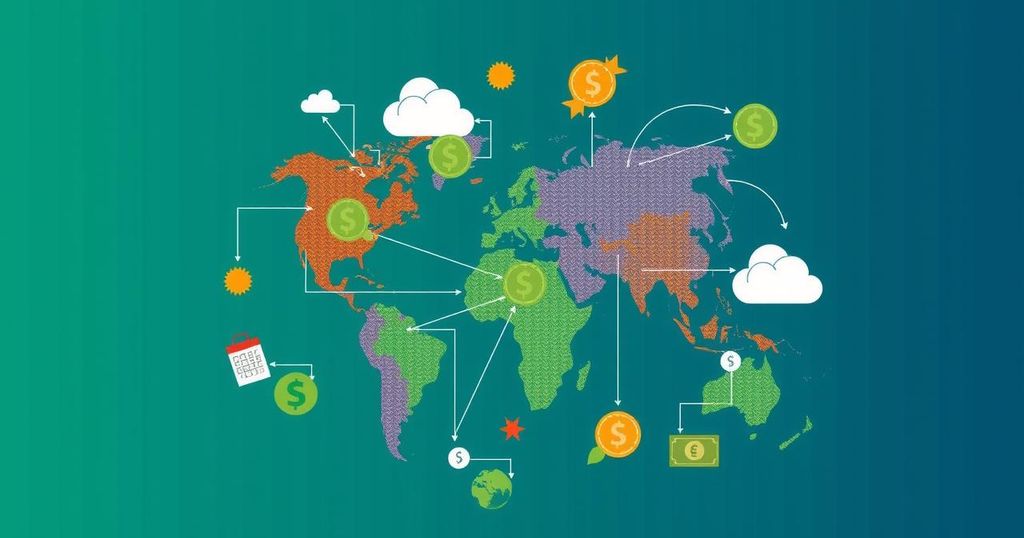Embedding Education in Climate Finance: A Path to Resilience and Opportunity

COP29 in Baku focuses on the critical link between education and climate finance, as over 400 million children faced disruptions in schooling due to extreme weather. Initiatives by Education Cannot Wait (ECW) aim to promote anticipatory actions in education to combat these challenges, emphasizing community involvement and urgent financing. The discussions call for greater allocation of climate funds towards educational resilience and highlight the importance of preparing future generations for impending climate challenges.
Education faces unprecedented challenges as crises displace children from schools, risking their safety and future. COP29 in Baku seeks to establish a crucial intersection between education and climate finance, aiming to enhance national climate commitments under the Paris Agreement. The Education Cannot Wait (ECW) initiative has commenced projects in Somalia and Afghanistan, emphasizing anticipatory actions to shield children’s education from climate disruptions. At COP29, ECW hosted discussions on themes like advancing anticipatory action through cooperation, addressing the intersection of conflict and climate on education, and building resilient educational systems in vulnerable countries. Key stakeholders, including policymakers and experts, underscored the necessity of proactive measures to safeguard educational access amid climate-induced challenges. Adenike Oladosu from ECW articulated the need for innovative climate-smart educational facilities to mitigate climate impacts on students. Countries like Pakistan are already experiencing severe climate repercussions. Zulekha, a representative from Pakistan’s National Disaster Management Authority, reported that extreme weather events, such as the devastating 2022 floods, severely damaged educational infrastructure, displacing millions of children. Oladosu emphasized that anticipatory actions are vital to eliminate irreplaceable losses, such as school days lost during climate emergencies, which often lead to increased dropout rates and hazardous situations for vulnerable youth. Lisa Doughten from OCHA highlighted how humanitarian crises exacerbated by climate change disrupt educational access for millions, particularly in conflict zones where challenges are compounded. The discussions at COP29 called for leveraging meteorological data to prepare for predictable climate disasters and ensuring the swift allocation of funds for pre-planned educational initiatives. The summit reiterated education’s transformative potential in cultivating climate resilience. Preparing the future generation with necessary skills for a green economy is paramount, yet currently, a mere fraction of climate finance is allocated to education. Only 0.03 percent of global climate funding supports educational initiatives, leaving children disproportionately affected by climate disruptions. Moreover, only a portion of the national commitments under the Paris Agreement considers the educational needs of children, underscoring the urgent need for focused attention on this critical aspect. In contexts like Chad, where the ECW has built climate-resilient classrooms, educational resilience proved effective amid environmental challenges. Such initiatives demonstrate the importance of directing financing swiftly and transparently to address urgent educational needs in the face of climate adversities. Looking ahead to COP30, it becomes imperative to incorporate education into the newly proposed Loss and Damage Fund, as the losses incurred from interrupted learning due to climate-related events are immense. Investing in education is not merely an economic decision; it is a fundamental human right essential to shaping future generations capable of addressing global challenges.
The intersection between education and climate finance has emerged as an urgent topic in international discussions, especially in light of the escalating impact of climate change on vulnerable populations. Educational institutions are often among the first casualties of climate-related disasters, jeopardizing access to learning and increasing dropout rates. Initiatives like the Education Cannot Wait (ECW) fund strive to address this issue, advocating for strategies that integrate education into climate action frameworks worldwide. The current COP29 discussions focus on ways to enhance national commitments to education in the context of the Paris Agreement, including anticipatory actions to safeguard children’s educational opportunities in crisis-ridden environments.
In summary, the integration of education within climate finance discussions is crucial to mitigate the impact of climate change on children’s learning opportunities. The ongoing initiatives and discussions at COP29 aim to create resilient educational systems that can withstand climate challenges, ensuring that every child can pursue their dreams uninterrupted. Increased financial commitment to educational initiatives amidst climate disasters is vital for the sustenance of future generations and the holistic development of communities.
Original Source: www.ipsnews.net






